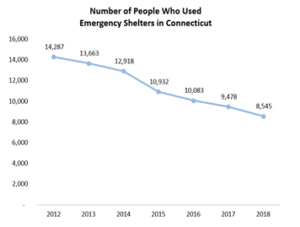Say What You Need To Say: How Lisa Tepper Bates’ fearless leadership, coalition building and question asking set a local and national model for addressing homelessness
Amidst the COVID-19 pandemic, this Emerge alumna is working to keep Connecticut safe, housed, and healthy.

This week, Emerge is excited to feature 2018 alumna Lisa Tepper Bates!
Bates grew up on a dairy farm in Colorado, but left for Washington DC to become one of the first generation in her family to graduate college. After graduating from the Georgetown School of Foreign Service, she served as a diplomat for the State Department for thirteen years. One MBA degree in Nonprofit Management later, she ended up working in housing. Now, she is the Senior Director for Housing and Transit Oriented Development for the office of the Connecticut Governor, and is the Chair of Recovery and Immediate Needs in response to the COVID-19 crisis.
“There is no normal day lately,” Bates described. “This is an unprecedented emergency; we’ve never seen anything like it in my lifetime.”
Bates says her job has changed “100 percent” since the pandemic began. She spends her workdays planning and coordinating with nonprofits and services all over the state to ensure that our communities can meet the urgent needs of CT residents — from housing to food to mental health supports — during this time.
“This is a big enough emergency that it requires everything we’ve got at the local level, at the state level, at the regional level, the federal level,” Bates said. “We have to figure out how to make those gears click. We need the biggest team we’ve ever had.”
Bates says she communicates with about 150 people every week in different team settings.
“We’re trying to build a coordinated structure so that there’s communication all the way down to the local level, and then back up from the local level in a systematic way,” Bates explained. “Recovery from disasters starts locally.”
Luckily for Connecticut, evolving systems to make them better is kind of Bates’ specialty. Since she first started working in housing, her goal has been to develop “a truly coordinated system of response to homelessness.”
If there’s one thing that you could make right in the life of a vulnerable person or a child in America, it is to help stabilize their housing.”
– Lisa Tepper Bates
Bates’ work in housing started in 2009, and includes leading the Connecticut Coalition to End Homelessness from 2012-2018 . There, together with partners across the state, she led Connecticut’s development of an approach to homelessness called “shelter diversion.” The approach aims to help those struggling with housing to problem-solve by connecting them with financial and social services, rather than solely with a shelter.
“When I entered the field, if someone called up a homeless shelter… you’d [say] ‘I have a bed or I don’t have a bed,’” Bates said. “What if we took the approach that we don’t actually want people to have to come into an emergency shelter, we want them to be able to stay home, stay where they are…what is we said instead of ‘I’m a hammer you’re a nail, I’ve either got a shelter bed or I don’t’, what if instead we trained out frontline workers to have a discussion?”
According to Bates, 80% of families with children who approach the Connecticut homelessness response system thinking they need a bed in an emergency shelter are now diverted to other resources to help them.
“We went from a system where you had a lot of different nonprofits and a lot of state agencies and a lot of different players trying to do something about homelessness,” Bates said. “We brought them together, created a coordinated structure, created teams across the state, and…we were able to actually decrease (in annual terms) homelessness in Connecticut by forty percent in six years, at the same time that many states were seeing increases.”
A forty percent decrease in six years.
“What we built here in Connecticut is still a national model for how to do this work better,” Bates said.
She credits this progress to a unique outlook on policy.
“It’s really important to always keep trying to think differently, to turn things forty-five degrees, ninety degrees,” Bates said. She advises people to always ask if there’s a different way to do something. “When you [ask] that, you almost always unearth something [important].”
“We were able to actually decrease (in annual terms) homelessness in Connecticut by forty percent in six years, at the same time that many states were seeing increases.”
-Lisa Tepper Bates
Unearthing new strategies is vital in the national fight to end homelessness. The National Alliance to End Homelessness reports that roughly 553,742 people experience homelessness on a given night.
“If there’s one thing that you could make right in the life of a vulnerable person or a child in America, it is to help stabilize their housing.” Bates said. “It’s not that other services and types of support aren’t important, but for me…I realized, ‘wow, okay if I can only work in one place, this is a place where you can really make a difference in peoples’ lives.’”

Data collected by the Connecticut Coalition to End Homelessness
This idea of making a difference in policy is part of the reason why Bates joined Emerge.
“It was a tremendous opportunity to get to know my fellow Emerge sisters who are…incredible people who have gone on to do really important work, whether they won or lost their election. So, I learned a lot from them,” Bates said. “I learned a lot from the incredible curriculum about the nuts and bolts of politics in America. And then I was lucky enough to work on this Governor’s campaign, so I had some great new tools and understanding of how to be effective that I was able to employ.”
Bates urges women who want to work in public policy, politics, or public service to speak their minds.
“I had a boss who said once, ‘Never be afraid of saying what you need to say. Be afraid of not saying it,’” Bates advised. “There’s always a risk that you’ll make a mistake when you say your piece — that’s true for everyone, and that’s ok. Mistakes are mistakes, but not saying what you know you should say at that moment, there’s no way to get that back. I think that’s particularly important for women.”
Emerge is so proud of all the incredible work Bates is doing, and the trail she is blazing for other women in Connecticut public policy.
Inspired by this story? Become a sustaining donor today!